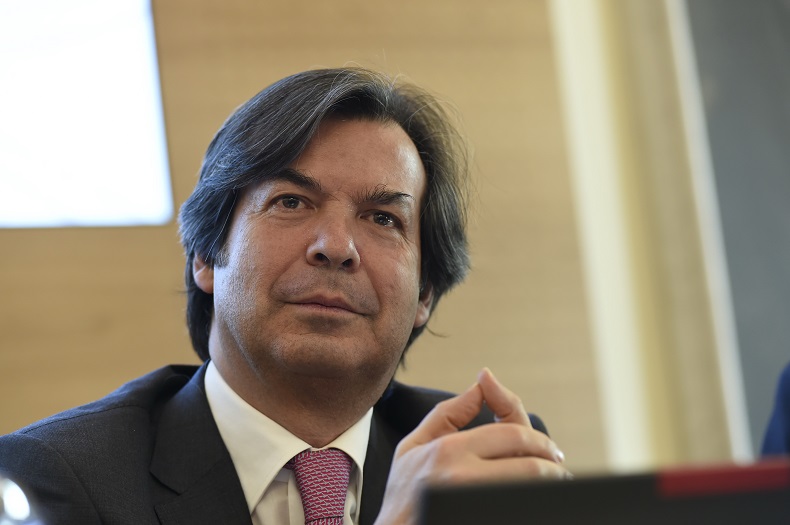Intesa Sanpaolo’s board of directors adopted, based on the proposal of CEO Carlo Messina, has actioned a new organizational structure that it said leverages the strengths that have established the bank as a leader in Europe and focuses on the Group’s capacity to innovate.
The renewed organization readies the Group to tackle the challenges facing the European banking sector, by harnessing
the best new managerial talents and by valuing internal resources, all with a long-term perspective, it said in a statement on 28 March.
A new Wealth Management Divisions structure, led by Tommaso Corcos, will provide unified oversight of the wealth management businesses.
This structure includes the Insurance Division, headed by Virginia Borla; Asset Management, led by Maria Luisa Gota; and Private Banking, led by Lino Mainolfi.
A “Fees & Commissions” Steering Committee, chaired directly by the CEO, will focus on monitoring, overseeing, and coordinating strategies to increase commissions revenues across all the Group’s Divisions.
Saverio Perissinotto, who has successfully led the growth of the Asset Management Division in recent years, achieving significant results, will be chairman of Eurizon Capital SGR.
The new organization, which will take effect on April 2nd, includes:
• A single oversight unit consolidating the Group’s wealth management activities, aiming to accelerate growth and increase the integration of product factories;
• A new governance area focused on ESG issues to steer the Group’s sustainable development strategies, with a special commitment to social matters and the fight against inequalities;
• A new unit dedicated to charting the Bank’s future transformations, identifying innovative organizational and operational models, and meeting the challenges of technological innovation and Artificial Intelligence by fostering new professional skills, that better equip the Bank to achieve new goals;
• A streamlining of the governance areas reporting directly to CEO Carlo Messina, through a new organizational tier of Chiefs; and
• A strengthening of the Chief Lending Officer area, which will be responsible for a new credit decision-making model, consolidating the important milestones achieved and ensuring further sustainability of the results (Zero-NPL Bank).
“These significant and wide-ranging changes are marked by a generational transition introducing new talents in key positions, guided and supported by highly-experienced individuals who have long held leadership roles within the Group”, the statement said.
A newly established Chief Sustainability Officer governance area is tasked with strategic direction on sustainability issues, activity planning, and monitoring. This Area, led by Paola Angeletti, will incorporate activities currently distributed across various organizational units of the Group, and includes the creation of the Chief Social Impact Officer governance area, led by Paolo Bonassi.
The new Chief Governance, Operating and Transformation Officer governance area, led by Nicola Maria Fioravanti, incorporates several Group governance areas: the Chief Transformation & Organization Officer area, led by Cristina Motta; the Chief People and Culture Officer area, headed by Roberto Cascella; and the Chief Equity, Legal & M&A
Officer area, led by Flavio Gianetti. Paolo Maria Grandi, formerly Chief Governance Officer, who has been of utmost importance in the Group’s defining operations and has provided enlightened guidance for many years, will continue to support CEO Carlo Messina as a Senior Advisor.
Within the International Subsidiary Banks Division (ISBD), led by Marco Elio Rottigni, an “ISBD Governance Coordination” area has been established, led by Paola Papanicolaou, who also serves as Deputy Chief of the Division.
In the Chief Data, A.I., and Technology Officer governance area – headed by Massimo Proverbio – Enrico Bagnasco and Tommaso Pellizzari will serve as Deputy Chiefs and will be responsible for the coordination structures “Group Technology Services” and “IsytechEvolution”, respectively.
The position of Chief Financial Officer is assigned to Luca Bocca, previously Deputy CFO. Elisabetta Stegher has been appointed as manager responsible for preparing the company’sfinancial reports, succeeding Fabrizio Dabbene, who has ensured rigor and effectiveness in his long-held responsibilities. Within this governance area, the newly-established “Group Treasury & Capital Management” coordination structure will be led by Alessandro Lolli, who also becomes Deputy CFO. Stefano Del Punta, long-time CFO and a key figure in the Group, earning widespread recognition from investors, will continue to support CEO Carlo Messina as a Senior Advisor.
The following individuals remain confirmed in their roles within structures not affected by the new organization:
Business Divisions
• Stefano Barrese, Banca dei Territori Division
• Mauro Micillo, IMI Corporate & Investment Banking Division
Governance Areas
• Davide Alfonsi, Chief Risk Officer
• Piero Boccassino, Chief Compliance Officer
• Alfonso Guido, Chief Cost Management Officer
• Stefano Lucchini, Chief Institutional Affairs and External Communication Officer
• Raffaello Ruggieri, Chief Lending Officer
• Claudio Testa, Chief Audit Officer
CEO Carlo Messina (pictured) said: “We are revitalizing Intesa Sanpaolo with an organization that brings together young individuals in key roles and managers with a wealth of experience. Our ability to generate new managerial talent ensures that the Bank remains an enduring European leader. My heartfelt thanks go to Fabrizio Dabbene, Stefano Del Punta, Paolo Grandi and Saverio Perissinotto.
“I wish great success to those taking on new roles and to all the People of Intesa Sanpaolo; I am confident that both the Bank and the communities we serve can rely on them. Just as they can rely on my own personal commitment in the coming years. We are leaders in Europe for our financial solidity, sustainable profitability, the uniqueness of our business model, our capacity for technological innovation, and our sensitivity to ESG issues. Today, we have taken another important step in the growth of our Group, a pillar of Italy’s real and social economies. All of this is possible thanks to the quality
of our people.”





